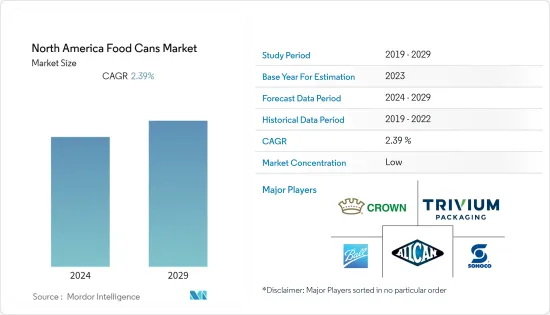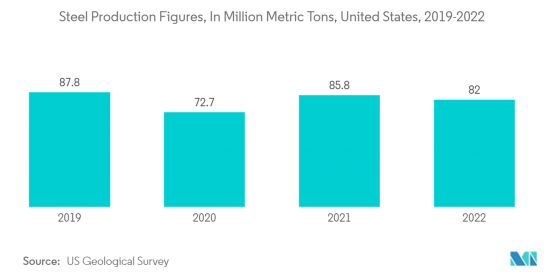PUBLISHER: Mordor Intelligence | PRODUCT CODE: 1408536

PUBLISHER: Mordor Intelligence | PRODUCT CODE: 1408536
North America Food Cans - Market Share Analysis, Industry Trends & Statistics, Growth Forecasts 2024 - 2029

The North America food cans market was valued at USD 9.1 billion in 2024 and is expected to be valued at USD 10.3 billion by 2029 with a CAGR of 2.39% over the forecast period. In this region, canned food has become a part of many individuals' diets. The ever-changing lifestyles and consumers' choices toward convenience foods have shown a rising trend in the past few years. North America is an extensive user and producer of food cans. Metal containers play a vital role in preserving food without microbiological spoilage.
Key Highlights
- The market is mainly driven by the increasing consumption of various packaged food products that are convenient to use or consume. Due to the accelerated pace of life and the increase in the workforce, the consumption of ready meals has increased. This directly drives the growth of the market.
- Food cans preserve the food and prolong shelf life, preventing spoilage due to external factors such as sunlight and air. Many fast-food chains and restaurants widely use canned food products due to their cooking convenience. They also remain free from contamination and spoilage for a longer period. Also, the rise of the millennial population and its wide acceptance has led them to opt for canned foods as they are easier to cook and save preparation time.
- Moreover, in August 2023, the government of the United States announced new tariffs on can-making metal imported from China, Germany, and Canada. This move, food companies state, could lead to higher prices for some canned foods. Chinese products would be subject to the highest tariffs of the three countries, a levy of 122.52% of their import value.
- The industry is also facing challenges with bio-based plastics, as they are widely utilized across various applications, including food packaging, owing to higher availability of resources, enhanced thermal resistance, higher flexibility and toughness, and other similar properties. The region's biodegradable plastics market is anticipated to rise, particularly during the forecast period, due to the growing demand for bio-based packaging in the food sector. Bio bags and bio-based plastics have higher tensile strength, are eco-friendly, and are convenient compared to conventional plastics.
- The COVID-19 pandemic caused a favorable impact on the consumption of canned foods in the region, as people turned to home cooking and retail purchases. Retail is one of the primary points of sale for canned food, for which the demand rose during the initial phases of COVID-19 and the lockdown period. The sales of canned food products increased during the pandemic due to their long shelf life, which attracted customers subjected to home quarantines, owing to regulatory measures restricting ease of movement by the nation's government.
North America Food Cans Market Trends
Steel Cans to Gain Market Growth
- The food industry is constantly evolving. In recent years, consumer preference for convenience food has shown an upward trend due to the ever-changing lifestyle. They can provide many benefits, such as rigidity, stability, and high barrier properties, which store goods with a longer shelf life. Steel material has significant properties, such as being softer and lightweight, so that the manufacturers can save costs associated with logistics.
- In August 2023, United States Steel Corporation and Google Cloud announced a new partnership to build applications using Google Cloud's generative artificial intelligence ('gen AI') technology to drive efficiencies and enhance employee experiences in the largest iron ore mine in North America. As one of the leading manufacturers engaging in gen AI with Google Cloud, US Steel continues to advance its more than 100-year legacy of innovation.
- Further, in March 2023, the Minister of Finance announced that Canada banned importing Russian steel and aluminum products. Through regulatory amendments, the importation of all Russian aluminum and steel products, including containers and other household items, is now prohibited. Also banned are all primary steel products, including iron and non-alloy steel, as semi-finished and finished products. Such bans would leverage the domestic steel market in the region, driving the growth of steel cans over the forecast period.
- Individuals in the region prefer more processed and ready-to-eat meals due to their busy lifestyles. Steel cans are fully recyclable and lose none of their resilience or inherent qualities, no matter how often it is recycled. According to the US Geological Survey, steel production in 2022 was 82 million metric tons, which decreased compared to the previous year from 85.8 million metric tons. The decrease could be due to various reasons, such as trade and supply chain challenges.
- Moreover, owing to rising ecological concerns, customers are evolving conscious about limiting the usage of plastics, which, in turn, is urging the need for steel cans in the region. Further, the increasing consumption of ready-to-eat meals, in conjunction with the growing efforts by manufacturers to finance advertising campaigns, is strengthening the industry's growth, thereby boosting the sales of cans in the region.

Ready Meal to Witness Growth in the Region
- The United States holds a significant market share in revenue owing to the rising concerns regarding the usage and consumption of sustainable packaging materials. The country accounts for a substantial percentage of the total consumption of aluminum cans, mainly with the demand for ready meals and processed foods.
- These aluminum cans offer a higher recycling rate and more recycled content than the other package types. For instance, according to the Aluminum Association, it is one of the most recycled materials on the market. Recycling also saves more than 90% of the energy required to produce new metal, thereby reducing the cost of production.
- The future of ready meals will likely be influenced by several factors, including changing consumer preferences, technological advancements, and sustainability concerns. With increasing stress on health and wellness, there is a growing demand for meals made with natural and organic ingredients that cater to specific dietary needs. Sustainability is another key consideration, with an ever-increasing emphasis on eco-friendly packaging and reducing food waste. Overall, the future of ready meals will likely involve a greater focus on customization, convenience, and sustainability.
- Companies operating in the region are expanding their business. For instance, recently, Instacart launched an in-app hub for ready-made meals from grocery stores available from more than 4,100 stores across 35 states. Under the Ready Meals tab, customers can find fresh soups, sushi, prepared sandwiches, salads, take-and-bake casseroles, and other items. Publix, Kroger, and Ahold Delhaize's U.S. banners are supplying meals and will launch custom storefronts within the hub, according to Instacart.
- Also, the focus on stockpiling food with long shelf life, owing to the change in consumer behavior as a result of the pandemic, has contributed to the rise in the usage of cans for packaging food and is anticipated to leave a long-lasting positive impact on the growth of the studied market. Moreover, plant-based ready meals were valued at USD 1,055.1 million in 2022.
North America Food Cans Industry Overview
The competitive rivalry in the North American food cans market is high owing to many key players continually trying to gain maximum market share through collaborations, promotions, investments, and more. Some of the major players are Crown Holdings, Inc., All-State Can Corporation, Wells Can Company, Ball Corporation, Sonoco Products Company Trivium Packaging, and more.
In September 2022, Crown Holdings Inc. partnered with Ardagh Metal Packaging, the Can Manufacturers Institute, and more to host the first Global Aluminium Can Sustainability Summit. The Summit brought together more than 100 global attendees from different parts of the aluminum supply chain, such as primary material suppliers, packaging manufacturers, research organizations, and beverage brands. The Summit facilitated essential discussions to drive actionable progress toward the aluminum industry's sustainability goals.
Additional Benefits:
- The market estimate (ME) sheet in Excel format
- 3 months of analyst support
TABLE OF CONTENTS
1 INTRODUCTION
- 1.1 Study Assumptions and Market Definition
- 1.2 Scope of the Study
2 RESEARCH METHODOLOGY
3 EXECUTIVE SUMMARY
4 MARKET INSIGHTS
- 4.1 Market Overview
- 4.2 Industry Value Chain Analysis
- 4.3 Industry Attractiveness - Porter's Five Forces Analysis
- 4.3.1 Bargaining Power of Suppliers
- 4.3.2 Bargaining Power of Buyers
- 4.3.3 Threat of New Entrants
- 4.3.4 Threat of Substitute Products
- 4.3.5 Intensity of Competitive Rivalry
- 4.4 Impact of Ukraine-Russia Standoff on the Market
5 MARKET DYNAMICS
- 5.1 Market Drivers
- 5.1.1 Increased Recyclability of Cans
- 5.1.2 Convenience and Sustainability Offered by Canned Food
- 5.2 Market Restraints
- 5.2.1 Rising Adoption of Bio-Based Plastic Solutions
6 MARKET SEGMENTATION
- 6.1 By Material Type
- 6.1.1 Aluminium Cans
- 6.1.2 Steel Cans
- 6.2 By Application
- 6.2.1 Ready Meals
- 6.2.2 Powder Products
- 6.2.3 Fish and Seafood
- 6.2.4 Fruits and Vegetables
- 6.2.5 Processed Food
- 6.2.6 Pet Food
- 6.2.7 Other Applications
- 6.3 By Country
- 6.3.1 United States
- 6.3.2 Canada
7 COMPETITIVE LANDSCAPE
- 7.1 Company Profiles
- 7.1.1 Crown Holdings, Inc.
- 7.1.2 Wells Can Company
- 7.1.3 AllState Can Corporation
- 7.1.4 J.L. Clark Inc
- 7.1.5 CANPACK S.A. (CANPACK Group)
- 7.1.6 Container Supply Co.
- 7.1.7 Independent Can Co.
- 7.1.8 Can Corporation of America
- 7.1.9 Great Western Containers Inc.
- 7.1.10 Trivium Packaging
- 7.1.11 Ball Corporation
- 7.1.12 Sonoco Products Company
8 INVESTMENT ANALYSIS
9 FUTURE OF THE MARKET




